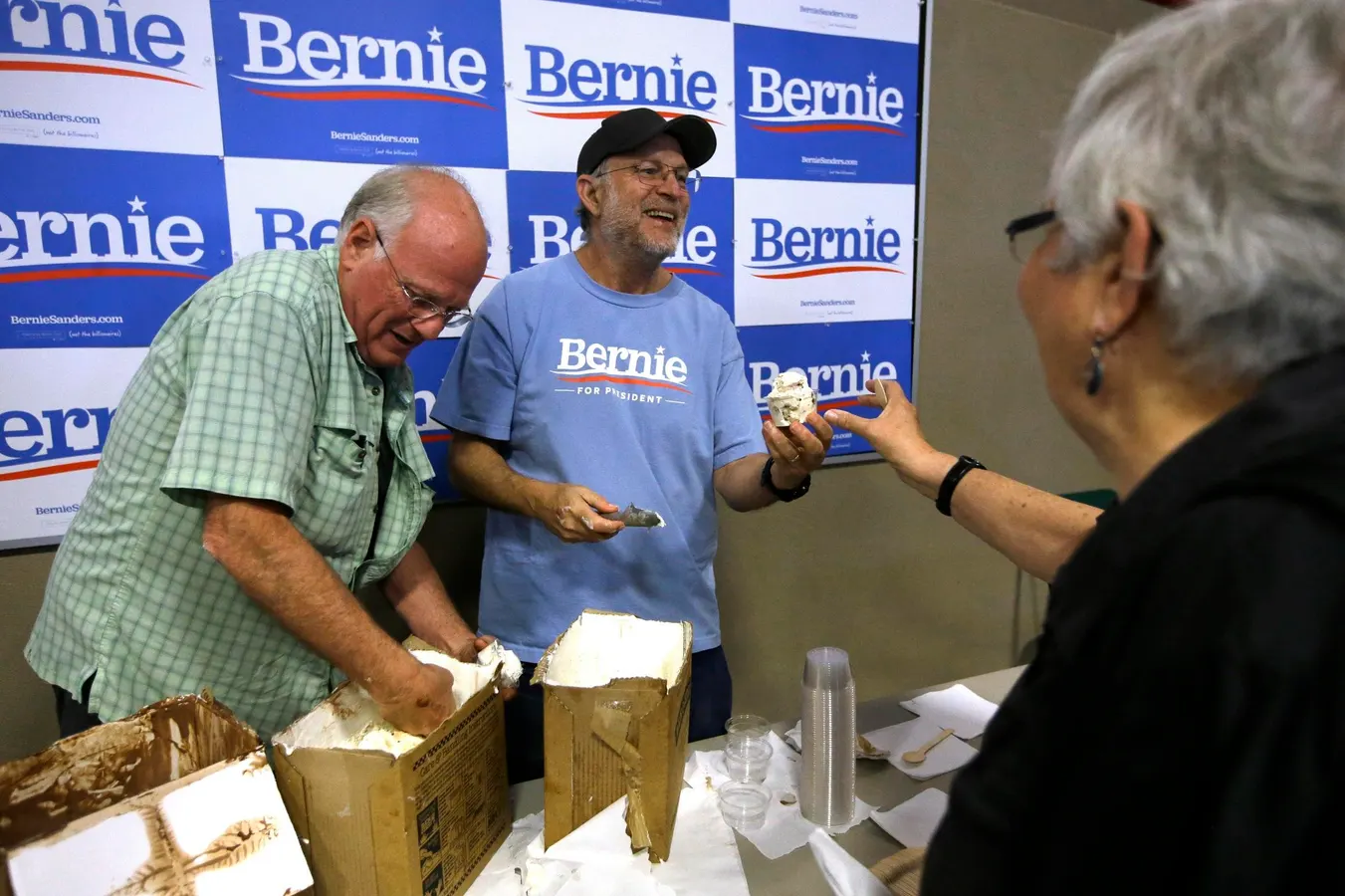By Contributor,Paul Klein
Copyright forbes

Ben & Jerry’s co-founder Ben Cohen and fellow co-founder Jerry Greenfield scoop ice cream before a campaign event for Sen. Bernie Sanders in 2019 (AP Photo/Steven Senne, File)
Copyright 2019 The Associated Press. All rights reserved
Corporate Activism Under Donald Trump: A Fight For Surviva
Last week Jerry Greenfield resigned from Ben & Jerry’s because it has been “silenced and sidelined for fear of upsetting those in power.” For almost fifty years, Ben & Jerry’s, and Ben and Jerry, have been defining what it means to bring activism to business. However, under President Trump, corporate social responsibility is facing a backlash, if not outright collapse, and a half century of social impact leadership is in jeopardy.
Trump has ramped up an “assault on American democracy” and fostered an environment where companies feel pressure to either curry favor with his administration or at least not draw its ire, according to The Guardian. Firms have fired or disciplined employees for criticizing Trump or his allies. ABC’s suspension of late-night host Jimmy Kimmel after a monologue critical of MAGA’s reaction to the killing of Charlie Kirk is the latest example.
Greenfield’s exit, and ABC’s suspension of Jimmy Kimmel, are indicators that profit and personal gain and the fear of political retribution have superseded responsible, ethical, and reasonable corporate behavior. If an ice cream brand, albeit a symbol of progressive business practice, has become a flashpoint, what lies in store for other corporate leaders who still believe that purpose is as important as profit? Greenfield and Cohen’s struggle with Unilever, and now with the Magnum Ice Cream Company, reflect a broader reckoning: socially minded businesses are struggling to survive in the era of Donald Trump where activism is seen as a liability, not a strength, wrote David Kaufman in Monocle.
When Unilever acquired Ben & Jerry’s for $326 million in 2000, the ice cream company retained an independent “social mission board” with the authority to pursue its values-driven agenda without interference in day-to-day business decisions. This unique merger agreement enshrined their social mission in the company’s governance structure “in perpetuity,” ensuring they could continue to “stand up and speak out” on real-world events. Unilever bought more than an iconic, profitable ice cream brand, it also bought a perspective that is rooted in social justice and activism.
“For more than twenty years under [Unilever] ownership, Ben & Jerry’s stood up and spoke out in support of peace, justice, and human rights, not as abstract concepts but in relation to real events happening in our world,” Greenfield noted in his resignation letter. The company continued to take bold stands, from climate change campaigns to advocating for refugees and LGBTQ+ rights. Unilever, for its part, has referred to Ben & Jerry’s as “a pioneering super-premium ice cream maker with a three-part mission focused on social, product and economic values that are baked into the business.”
MORE FOR YOU
The first major rift between Ben & Jerry’s came in 2021, when the brand decided to stop selling its products in Israeli-occupied West Bank territories, citing human rights concerns. In response Unilever sold off Ben & Jerry’s Israel business to a local licensee. Last year, Ben & Jerry’s sued Unilever for allegedly fighting its calls for a Gaza ceasefire and an end to US military support for Israel. The 2024 suit claimed that Unilever had threatened to dismantle the ice-cream company’s independent board and punish members if Ben & Jerry’s issued a call for a ceasefire, according to The Guardian. In its complaint, Ben & Jerry’s said Unilever also refused to let the company release a social media post that identified issues it believed would be challenged during President Donald Trump’s second term — including minimum wages, universal health care, abortion and climate change, according to AP News.
Most recently, Unilever created an entity called the Magnum Ice Cream Company to house its ice cream division. “At The Magnum Ice Cream Company, our sustainability strategy is designed to proactively manage environmental and social risks, strengthen our resilience and unlock long-term growth,” the company states on its website.“We are committed to evolving this strategy over time, with a sharp focus on the issues that matter most: reducing our climate footprint, responsibly sourcing key ingredients, upholding human rights across our value chain and innovating in sustainable packaging.”
“But a different logo doesn’t mean different values,” cautioned in an open letter from Ben & Jerry’s noting that Magnum’s leadership will include “many of the same people involved in Unilever’s efforts to silence Ben & Jerry’s”
Earlier this month, as Magnum’s CEO and team rolled out growth plans in London, Ben Cohen showed up outside with protesters, demanding that Unilever “free Ben & Jerry’s to protect its social values.” The image was striking: the 72-year-old ice cream icon picketing his own brand’s corporate parent. Magnum’s new CEO, Peter ter Kulve, rebuffed the idea of letting Ben & Jerry’s go its own way. The message was clear: Ben & Jerry’s, with its strong sales and devoted following, is a valuable asset, but its values have become a liability in the eyes of its new owners. “Ben & Jerry’s cannot thrive under an organization that stifles its values and that buckles under political pressure,” the founders declared, rallying supporters to help liberate the ice cream company from its new owners.
Greenfield’s resignation comes at a time when virtually every big brand has gone radio silent. In Trump’s second term, companies are scrambling to avoid the slightest appearance of being socially responsible, let alone being seen as social activists. “Ben & Jerry’s has in recent months been a lonely voice among well-known brands speaking out on issues like Gaza and President Donald Trump’s immigration stance, while other U.S. companies back away from diversity pledges, and their executives largely refrain from commenting on the White House’s policies,” reported Reuters.
For business leaders committed to both purpose and profit, the still unfolding Ben & Jerry’s saga offers lessons on how to remain true to your beliefs when you have a target on your back.
Remain Independent: The political circumstance today is extreme and volatile. If maintaining the integrity of your corporate purpose is non-negotiable, the only sure path is to remain independent.
Stand Firm: Demonstrate your backbone as a leader by standing firm for what you believe in. The tide may be against you today but the pendulum will swing back again. “The arc of the moral universe is long, but it bends towards justice,” said Dr. Martin Luther King Jr.
Align with owners who share your values: If another firm is acquiring your business, do your best to assess their cultural compatibility and commitment to your business and social mission. The more your owners or investors genuinely support your purpose (not just tolerate it), the less friction down the road. That being said, there are obviously no guarantees.
Be Consistent: Ben & Jerry’s (and Greenfield and Cohen) have always been willing to take controversial stands, and even lose business, for their principles. “You need to know what your brand is. You need to know what your brand is not. And you need to be consistent,” said Beth Egan, an associate professor of advertising at Syracuse University.
Personal integrity matters: Finally, as a leader you need to remember that your personal actions matter. Greenfield’s resignation on principle is a powerful statement that will become part of Ben & Jerry’s legacy. Not every leader is in a position to be as bold as Greenfield, but smaller acts of integrity, like publicly supporting employees who raise ethical concerns, reinforce a culture of authenticity and contribute to long term reputational value.
Ben & Jerry’s faces an uncertain future. Will Magnum put profit and politics over the progressive ethos that made Ben & Jerry’s unique? Can the activist ice cream brand find a way to maintain its voice under new ownership – or even regain its independence? The stakes are high: as Greenfield wrote, “If the company couldn’t stand up for the things we believed, then it wasn’t worth being a company at all.”
The Ben & Jerry’s saga is a microcosm of a broader reckoning in the business world. Before Trump’s second term, it was easier, and expected, for companies to proudly share what they were doing to make the world a better place. Today’s volatile political climate is clearly very different. The consumer marketplace has become hazardous for brands that have built their reputations based on being responsible, ethical and progressive.
Most companies are choosing to remain silent. But others, inspired by Ben & Jerry’s, will hopefully have the courage to maintain their commitment to activism and to make hard choices when necessary.
Editorial StandardsReprints & Permissions



